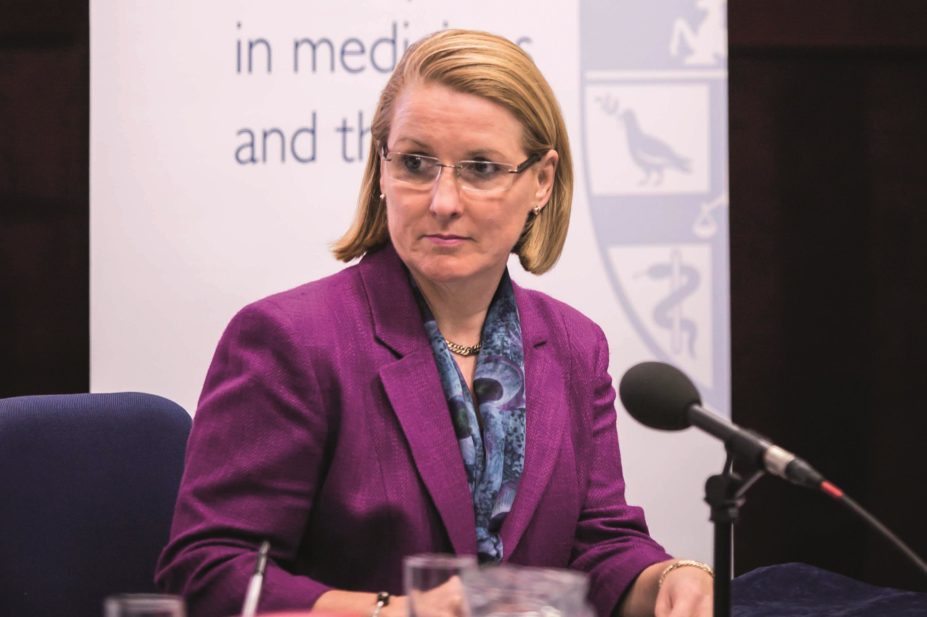
The Conservative Party Conference was a highly successful conference for pharmacy. Not only did we get confirmation from the Secretary of State for Health Jeremy Hunt that full “read-write” access for pharmacists to patient records is on his agenda, but Earl Howe, Minister for Pharmacy, is fully supportive of using pharmacists more effectively improving multi-disciplinary working to help deliver the NHS integration agenda.
Jointly sponsoring the Dod’s Health and Care Forum reception on Sunday night (28 September 2014), the Royal Pharmaceutical Society, along with other healthcare organisations such as Dementia Care, The Drinkaware Trust and the Dental Council, welcomed Hunt to speak on the future Conservative agenda for health.
Hunt visited each organisation around the room and spent a good period of time with the RPS. We discussed the progress on the summary care record proof-of-concept pilots and he shared his vision of pharmacists being able to fully populate patient records. We also highlighted the importance of access to records in transfer of care with regard to discharge medicines, and recounted an incident of a patient being discharged from hospital without the surgery or pharmacy being notified of the changes in his medicines. The patient was running out of medicines and it took 24 hours to obtain new prescriptions from the surgery, make up new dosette trays, and deliver them to him. With access to his records this could and should have been resolved within an hour.
Hunt proactively mentioned pharmacy in his speech talking about the importance of the role pharmacists have in ensuring not only the safe, efficient supply of medicines but the provision of advice and managing the medicines of patients with long-term conditions such as dementia. He is clear that the NHS needs to better harness the skills of the different healthcare professionals, reduce duplication of work and improve interprofessional working.
This was reinforced in a one-to-one meeting with Howe the following day, where he, too, emphasised the importance of better utilising pharmacy within the NHS. He is a great advocate for pharmacy, recognising that, as the third largest group of healthcare professionals, they need better recognition.
We discussed how some of the hurdles to pharmacist prescribing could be reduced, the conflict of the outdated decriminalisation of single dispensing errors with the new duty of candour requirement under the new NHS Constitution for pharmacists to report errors, and challenged him for a nationally commissioned minor ailments scheme. He advised that funding for this, along with the commissioning of other services, could be accessed under the “Better Care Fund”, which is worth £3.8bn next year.
Following our meeting Howe was the speaker at a fringe session on “The way forward for the NHS: will it be a key factor in the election campaign?” during which pharmacy was mentioned more than three times. He cited an example from Newcastle where, through GPs and pharmacists working together, the rate of emergency admissions from care homes fell by 40%. Answering a question from the floor, he reiterated the importance of including pharmacy more in primary care, the sharing of the patient record, of utilising the longer pharmacy opening hours for public health benefit and of the potential for reducing the 8% of hospital admissions due to medicines effects.
On Tuesday morning (30 September 2014) Dods and the RPS jointly hosted a breakfast fringe session on “Prevention is better than cure: community based interventions to promote a healthy lifestyle”. Speaking on behalf of the RPS I highlighted the importance of pharmacy in public health, with the provision of services such as emergency hormonal contraception, minor ailments, influenza vaccinations, needle exchange and supervised administration, through to medicines use reviews and the new medicine service to improve patient care, ensure correct use of medicines, reduction of pharmaceutical waste in the NHS and adding value.
With a lively discussion from the floor, it was delightful to meet other pharmacists present who were also local councillors, involved in their local health and wellbeing boards in their local authorities.
The RPS had private meetings with many MPs, pressure groups and healthcare charities, all very interested in the role of pharmacy and how we can work effectively together. We attended fringe sessions on health, asked questions and generally raised the profile of pharmacy. It was encouraging to meet with Pharmacy Voice, the National Pharmacy Association and the Pharmaceutical Services Negotiating Committee and, as we continue to build on these relationships within our profession, we strengthen our overall impact.
Finally, in the Prime Minister’s speech on Wednesday (1 October 2014), we were encouraged to hear the commitment made to ring-fence funding for the NHS for the next five years. The challenge for pharmacy is to ensure we play our rightful part in the delivery of healthcare to the nation.
Click here to see a conference video blog of Sibby Buckle
Sibby Buckle, MRPharmS, is an active party member of the Conservative Party and English Pharmacy Board member of the Royal Pharmaceutical Society. The views expressed here are her own and do not necessarily reflect those of the Society.
You may also be interested in
The importance of diverse clinical imagery within health education

Government should consider ways to prevent ‘inappropriate overseas prescribing’ of hormone drugs, review recommends
